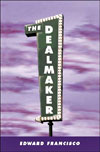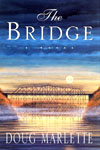
Comment
on this story
|
 |

In these two novels, A Good Man Is Hard to Find
by Jeanne McDonald
In Flannery O'Connor's famous short story, "A Good Man Is Hard to Find," a family traveling to Florida is accosted by The Misfit, a notorious criminal who has escaped from the federal penitentiary. While the other family members are taken one by one off into the woods to be shot, the grandmother tries to sweet-talk the murderer into seeing the error of his ways. "I just know you're a good man," she says desperately.
"Nome, I ain't a good man," The Misfit replies.
Good men are almost impossible to find in a new novel by Knoxvillian Edward Francisco, The Dealmaker (Walker Publishers, $29.95), to be released Sept. 1. In fact, only two of them surface to help Viola Sykes in her frantic attempts to find justice for her murdered son, Harold, who  returned from World War II shell-shocked and paranoid, reliving the battles he survived and imagining enemy faces on everyone he encounters. Burdette Webb, a courageous reporter, tries to help Viola find the truth behind Harold's shooting, and Assistant District Attorney Ron Scalf also keeps searching for a way to bring down Loather Parrish, a political boss who murders, steals, lies, and manipulates everything and everyone in the county. returned from World War II shell-shocked and paranoid, reliving the battles he survived and imagining enemy faces on everyone he encounters. Burdette Webb, a courageous reporter, tries to help Viola find the truth behind Harold's shooting, and Assistant District Attorney Ron Scalf also keeps searching for a way to bring down Loather Parrish, a political boss who murders, steals, lies, and manipulates everything and everyone in the county.
Francisco's dark and edgy Southern story takes us back to Knoxville in 1945, a time when the town was, indeed, a "scruffy little city," not governed so much as used by crooked political bosses to line their own pockets through graft and corrupt trade-offs. The author draws such concise and intimate portraits of his characters that readers who grew up in the Old South might even find them familiar. And when Viola lands in Eastern State Mental Hospital, Francisco chills the reader with his graphic description of a prefrontal lobotomy, an operation performed almost indiscriminately in the past to calm highly disturbed inmates by removing sections of the brain where memory is stored. If you're the type who closes your eyes in a violent scene in a movie theater, you'll probably skip some particularly horrific segments of this chapter—it's that terrifying.
Francisco, principal editor of The South in Perspective, an anthology of Southern literature from 1585 to the present, knows his Southerners and his South. With a gifted prose style—he's also a talented poet—and a keen ear for dialect, he moves us headlong and breathless through a cheerless landscape. Even Viola, after having made the ultimate sacrifice for her children, loses her battle to bring down the villains. "A good man is hard to find," says Red Sammy in O'Connor's story. "I remember the day you could go off and leave your screen door unlatched. Not no more." And certainly not after reading Francisco's novel. You'll feel much safer throwing the deadbolt.
Another dysfunctional southern family, the Cantrells, stumble through the pages of Doug Marlette's debut novel, The Bridge (HarperCollins, $26.50). The author, a Pulitzer Prize winner for his editorial cartoons, has undertaken a highly ambitious project in his attempt to weave together the history of a massacre that occurred at the Honea Path, South Carolina, textile mill  strike in 1934, by placing it in the framework of fiction, yet relying on bits and pieces of actual events to fill in the gaps and tie the two stories together. Marlette draws his information from snips of family history: During the 1934 mill workers' uprising at the Pioneer textile plant in Burlington, North Carolina, his grandmother, Gracie Pickard, was bayonetted by a National Guardsman and her sister was wrestled onto a wagon and driven around town by the sheriff as an example to other strikers. In addition, Walt Pickard, Marlette's great-uncle, was a union organizer who wrote a pamphlet about the Burlington Dynamite Plot, so the author was certainly given a lot of family information to work with. strike in 1934, by placing it in the framework of fiction, yet relying on bits and pieces of actual events to fill in the gaps and tie the two stories together. Marlette draws his information from snips of family history: During the 1934 mill workers' uprising at the Pioneer textile plant in Burlington, North Carolina, his grandmother, Gracie Pickard, was bayonetted by a National Guardsman and her sister was wrestled onto a wagon and driven around town by the sheriff as an example to other strikers. In addition, Walt Pickard, Marlette's great-uncle, was a union organizer who wrote a pamphlet about the Burlington Dynamite Plot, so the author was certainly given a lot of family information to work with.
The cover blurbs by big-name writers extolling the merits of the book are highly overblown, especially the one from Pat Conroy, who hails The Bridge as "...the finest first novel to come out of North Carolina since the publication of Thomas Wolfe's Look Homeward Angel." It makes you wonder whether Mr. Conroy has ever read the work of Elizabeth Spencer, Reynolds Price, Anne Tyler, Clyde Edgerton, Doris Betts, or Lee Smith. Marlette makes a valiant effort, but he doesn't quite pull off the novel's transitions from history to fiction. Besides, he overstuffs the story with unnecessary scenes—like the attack of the escaped convicts (reminiscent of a similar scene in Conroy's Prince of Tides, minus the tiger) or the bloody murder of Petey, the cockatiel, by marauding raccoons. And Marlette's thesis about the enmity existing between the narrator, Pick Cantrell, and his grandmother, Mama Lucy, also seems like a stretch, when the long-standing hostility evaporates after a single explosive argument. Marlette is an able writer, but he's not going to win a Pulitzer for this particular effort.

July 25, 2002 * Vol. 12, No. 30
© 2002 Metro Pulse
|